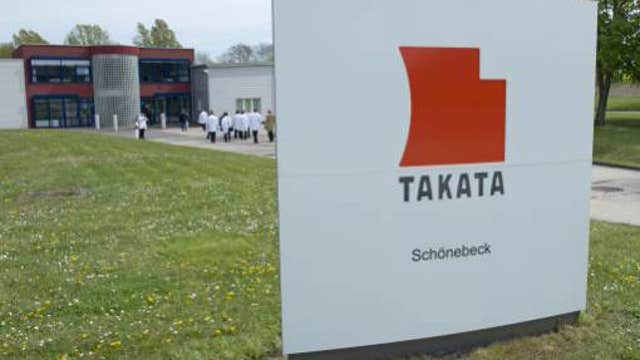Takata, Auto Execs Face Senate Over Deadly Air Bag Scandal
Executives from Japan's Takata Corp and two automakers faced tough scrutiny from U.S. senators on Thursday over the risk of millions of potentially defective air bags that can rupture upon deployment, shooting metal shards into cars.
The head of the U.S. National Highway Traffic Safety Administration is also scheduled to testify about criticism his agency has been slow to respond to the scandal, which has been linked to at least five deaths so far.
The hearing by the U.S. Senate Commerce Committee marks the first intensive public airing of the exploding air bag problem, and the second major auto safety scandal to grab headlines this year. General Motors Co <GM.N> has been embroiled in its own controversy over millions of recalled vehicles with potentially deadly ignition switches.
"I find it troubling, but more importantly I am sad that I am not surprised, that we find ourselves examining another example of manufacturers' failure to fulfill safety obligations that could have saved lives," said Democratic Senator Claire McCaskill.
Automakers, regulators and Takata - which supplies one in five air bags globally - have yet to pinpoint why these air bags are at risk. One theory is that moisture in humid climates can make the air bag inflator's chemical mix more volatile, even years after installation.
Since 2008, around 16 million cars with Takata air bags have been recalled worldwide, with more than 10 million of those in the United States.
Hiroshi Shimizu, senior vice president for global quality assurance at Takata, said the company believes that the "root causes" of the air bag inflator ruptures are a combination of three factors: the age of the inflator, persistent exposure to high humidity, and problems in production.
The recalls so far have been focused on humid areas. That approach was questioned at a news conference before the hearing on Thursday, when two U.S. senators linked the air bag defect to a 2003 death in Arizona.
Charlene Weaver died in 2003 in a Takata air bag-related accident in her 2004 Subaru Impeza in Arizona, her sister, Kim Kopf, said. Her car was not recalled until July of this year.
The death is potentially the sixth fatality linked to Takata air bags and the first reported outside of Honda vehicles.
A Subaru spokesman said the company, a unit of Fuji Heavy Industries <7270.T>, was not aware of one of its models being involved in a fatal accident in Arizona.
'PUTTING LIVES AT RISK'
Federal regulators at NHTSA on Tuesday suggested that Takata and five automakers expand their regional recalls of driver-side air bags to cover the entire United States, as senators have urged. But an official acknowledged on Thursday that such a move carries risks.
"At this point, a national recall of all Takata air bags would divert replacement air bags from areas where they are clearly needed, putting lives at risk," said NHTSA Deputy Administrator David Friedman in prepared testimony.
Takata and automakers say it will take time to work out how many more vehicles will need fixing - but it could be in the millions, and it is not clear how soon enough replacement bags will be available. Honda, Takata's biggest customer, accounts for 2.8 million cars in the regional recalls covering driver-side air bags to date, across 11 states.
Friedman as well as officials from Takata, Honda Motor Co Ltd <7267.T> and Chrysler <FCHA.MI> testified on Thursday.
Key questions are whether Takata knew of and hid the air bag defects before alerting automakers and regulators; what it has been doing to get to the bottom of the problems; and whether a full nationwide recall is needed.
Takata's Shimizu, and Rick Schostek, North American executive vice president for Honda, both offered apologies and condolences to the victims of faulty air bag inflators, and their families.
(By Eric Beech and Ben Klayman; Additional reporting by Bernie Woodall in Detroit, Doina Chiacu and Elvina Nawaguna in Washington; Writing by Julia Edwards; editing by Karey Van Hall and Matthew Lewis)




















